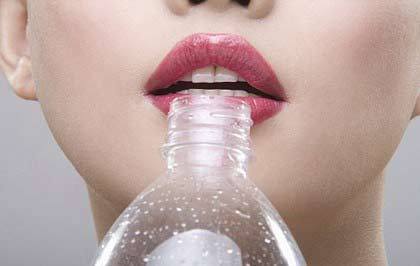|
 Drink from plastic bottles can raise the body’s levels of a controversial ‘gender-bending’ chemical by more than two thirds, according to tests.
|
|
Drink from plastic bottles can raise the body’s levels of a controversial ‘gender-bending’ chemical by more than two thirds, according to tests. Experts have been concerned about the possible health effects of bisphenol A (BPA) - an everyday chemical used in many plastic food and drink containers and tins as well as clear baby bottles - which is officially classified as toxic in some countries. A study found that participants who drank for a week from polycarbonate bottles showed a 69 per cent increase in their urine of BPA, which mimics the female sex hormone oestrogen. Researchers did not say how much liquid was drunk per day. Researchers from Harvard School of Public Health studied 77 students, who had first undergone a seven-day ‘washout’ phase in which they drank all cold beverages from stainless steel bottles in order to minimise BPA exposure. They were then given two polycarbonate bottles and asked to drink all cold beverages from them during the next week. Previous studies have suggested that high levels of BPA consumption are linked to birth defects, growth problems and an increased risk of heart disease and diabetes. In particular there are fears that heating the bottles, as parents would do when warming their baby’s milk, causes the chemical to leak in potentially dangerous quantities into the liquid contained within. The senior author of the latest study, Karin B. Michels, associate professor of epidemiology at HSPH and Harvard Medical School, said: "We found that drinking cold liquids from polycarbonate bottles for just one week increased urinary BPA levels by more than two-thirds." "If you heat those bottles, as is the case with baby bottles, we would expect the levels to be considerably higher. This would be of concern since infants may be particularly susceptible to BPA’s hormone gland-disrupting potential." Canada banned the use of BPA in polycarbonate baby bottles last year and some manufacturers have voluntarily eliminated it from their products. Most adults carry BPA in their bodies but expert opinion on the risks is divided. The European Food Safety Authority believes that people naturally convert the chemical into less harmful substances in the body. Previous studies had found that BPA could leach from polycarbonate bottles into their contents, but this study - published in US journal Environmental Health Perspectives - is the first to show the size of the corresponding increase in urinary BPA concentrations in humans. Harvard researcher Jenny Carwile said: ‘While previous studies have demonstrated that BPA is linked to adverse health effects, this study fills in a missing piece of the puzzle - whether or not polycarbonate plastic bottles are an important contributor to the amount of BPA in the body.’ 点击查看更多双语新闻
|
研究显示,饮用塑料瓶装水可使人体内颇具争议的“性别偏移”化学物质含量提升超过三分之二。 专家对双酚A(BPA)可能对人体健康造成的影响表示担忧,这是很多食品和饮料塑料包装盒、易拉罐、以及透明奶瓶中所含的常规化学成分,而一些国家已将该物质正式列为有毒物质。 研究显示,被调查者饮用PC(聚碳酸酯)塑料制成的瓶装水一周后,尿液中BPA的含量会增加69%,而BPA类似于雌性激素。 研究人员没有阐明被调查者每天喝多少液体。来自哈佛公共卫生学院的研究人员对77名学生进行了调查,这些被调查者首先要进行为期一周的“冲洗”,在此期间,为尽量不接触BPA,他们只能喝不锈钢水瓶装的冰饮料。 之后研究人员给被调查者两个PC塑料瓶,并要求他们在接下来的一周内,只用这种水瓶喝冰饮料。此前研究已证实,BPA摄入量高与出生缺陷、发育问题以及心脏病和糖尿病患病风险高有联系。 特别需要指出的是,加热塑料瓶会造成更大危害。例如当家长使用塑料瓶给宝宝热牛奶时,有一定量的潜在危险性化学物质会渗透进瓶内液体中。 该项最新研究的资深作者、哈佛公共卫生学院和医学院的流行病学副教授卡利文•B•米歇尔说:“我们发现,使用PC塑料制造的水瓶喝冷水仅一周,尿液内的BPA含量就会增长超过三分之二。” “我们认为,当你加热塑料瓶,比如热牛奶时,这种物质的含量会相当高。BPA有可能扰乱腺体激素分泌,婴儿对此极其敏感,因此我们对此应更加注意。”加拿大于去年禁止在生产PC塑料奶瓶时使用BPA,一些制造商主动从产品中去掉了该成分。 大多数成年人体内都携带有BPA,但对于该物质的危害性,专家的看法却有分歧。欧洲食品安全局称,人体会将该化学物质自动转化为危害较小的物质。 此前研究证实,BPA可以从PC塑料瓶体渗入所装液体内,但发表在《美国环境卫生展望》期刊上的这份研究首次证实了(使用PC塑料瓶饮水后)人体尿液中BPA浓缩物增加的对应含量。 哈佛大学研究人员珍妮•卡维尔说:“此前研究已证实BPA对健康有副作用,而这项研究填补了这种推断的空白---也就是PC塑料瓶是否是人体内BPA含量增高的罪魁祸首。” 相关阅读 (英语点津 实习生许雅宁编辑) |
|
Vocabulary: mimic:to be an imitation of; simulate; resemble closely(与...极相似;呈现...的形象) susceptible:accessible or especially liable or subject to some influence, mood, agency, etc(易受影响的,易得病的) |
